动词被动语态讲解
被动语态的讲解
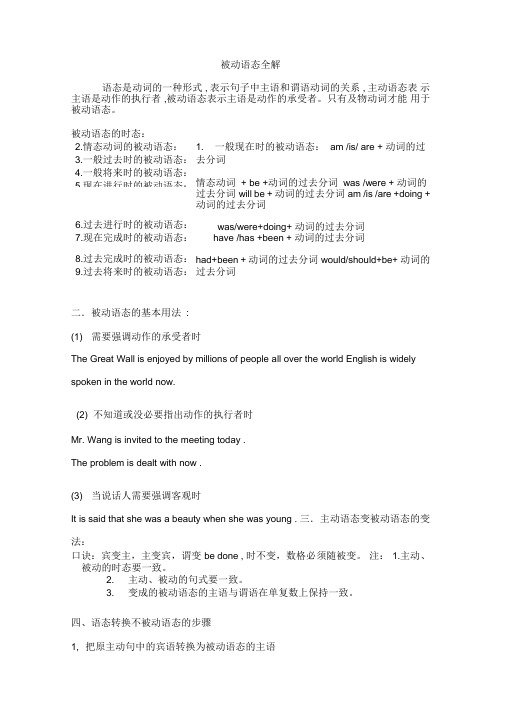
2.情态动词的被动语态:3.一般过去时的被动语态:4.一般将来时的被动语态:5.现在进行时的被动语态:6.过去进行时的被动语态:7.现在完成时的被动语态:8.过去完成时的被动语态:9.过去将来时的被动语态:被动语态全解语态是动词的一种形式, 表示句子中主语和谓语动词的关系, 主动语态表示主语是动作的执行者,被动语态表示主语是动作的承受者。
只有及物动词才能用于被动语态。
被动语态的时态:1. 一般现在时的被动语态:am /is/ are + 动词的过去分词情态动词+ be +动词的过去分词was /were + 动词的过去分词will be + 动词的过去分词am /is /are +doing +动词的过去分词was/were+doing+ 动词的过去分词have /has +been + 动词的过去分词had+been + 动词的过去分词would/should+be+ 动词的过去分词二.被动语态的基本用法:(1) 需要强调动作的承受者时The Great Wall is enjoyed by millions of people all over the world English is widely spoken in the world now.(2) 不知道或没必要指出动作的执行者时Mr. Wang is invited to the meeting today .The problem is dealt with now .(3) 当说话人需要强调客观时It is said that she was a beauty when she was young . 三.主动语态变被动语态的变法:口诀:宾变主,主变宾,谓变be done , 时不变,数格必须随被变。
注:1.主动、被动的时态要一致。
2. 主动、被动的句式要一致。
3. 变成的被动语态的主语与谓语在单复数上保持一致。
四、语态转换不被动语态的步骤1, 把原主动句中的宾语转换为被动语态的主语2, 把动词改为被动语态形式即"be+ 过去分词"。
被动语态(讲解)(DOC)
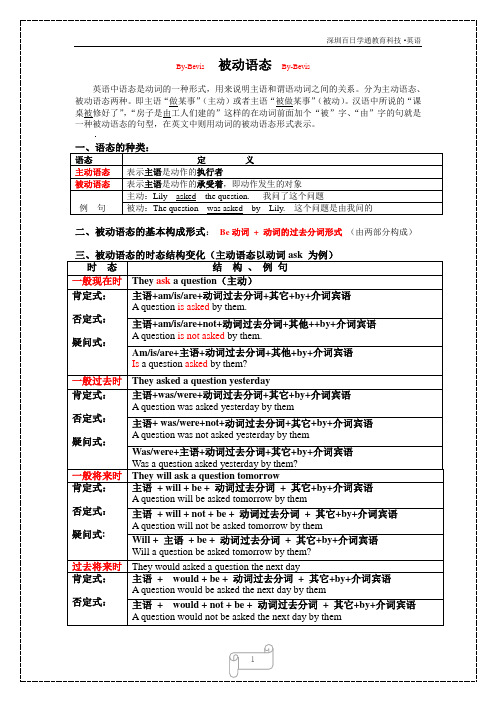
By-Bevis 被动语态By-Bevis英语中语态是动词的一种形式,用来说明主语和谓语动词之间的关系。
分为主动语态、被动语态两种。
即主语“做某事”(主动)或者主语“被做某事”(被动)。
汉语中所说的“课桌被修好了”,“房子是由工人们建的”这样的在动词前面加个“被”字、“由”字的句就是一种被动语态的句型,在英文中则用动词的被动语态形式表示。
一、语态的种类:语态定义主动语态表示主语是动作的执行者被动语态表示主语是动作的承受着,即动作发生的对象例句主动:Lily asked the question. 我问了这个问题被动:The question was asked by Lily. 这个问题是由我问的二、被动语态的基本构成形式:Be动词+ 动词的过去分词形式(由两部分构成)三、被动语态的时态结构变化(主动语态以动词ask 为例)时态结构、例句一般现在时They ask a question(主动)肯定式:否定式:疑问式:主语+am/is/are+动词过去分词+其它+by+介词宾语A question is asked by them.主语+am/is/are+not+动词过去分词+其他++by+介词宾语A question is not asked by them.Am/is/are+主语+动词过去分词+其他+by+介词宾语Is a question asked by them?一般过去时They asked a question yesterday肯定式:否定式:疑问式:主语+was/were+动词过去分词+其它+by+介词宾语A question was asked yesterday by them主语+ was/were+not+动词过去分词+其它+by+介词宾语A question was not asked yesterday by themWas/were+主语+动词过去分词+其它+by+介词宾语Was a question asked yesterday by them?一般将来时They will ask a question tomorrow肯定式:否定式:疑问式: 主语+ will + be + 动词过去分词+ 其它+by+介词宾语A question will be asked tomorrow by them主语+ will + not + be + 动词过去分词+ 其它+by+介词宾语A question will not be asked tomorrow by themWill + 主语+ be + 动词过去分词+ 其它+by+介词宾语Will a question be asked tomorrow by them?过去将来时They would asked a question the next day肯定式:否定式:主语+ would + be + 动词过去分词+ 其它+by+介词宾语A question would be asked the next day by them主语+ would + not + be + 动词过去分词+ 其它+by+介词宾语A question would not be asked the next day by them疑问式:Would + 主语+ be + 动词过去分词+ 其它+by+介词宾语Would a question be asked the next day by them?现在进行时They are asking a question now肯定式:否定式:疑问式:主语+ am/is/are + being +动词过去分词+其它+by+介词宾语A question is being asked now by them主语+am/is/are+being+not+动词过去分词+其它+by+介词宾语A question is being not asked now by them.Am/Is/Are+主语+being+动词过去分词+其它+by+介词宾语Is a question being asked now by them?过去进行时They were asking a question at that time肯定式:否定式:疑问式:主语+was/were+being+动词过去分词+其它+by+介词宾语A question was being asked at that time by them主语+was/were+being+动词过去分词+其它+by+介词宾语A question was being asked at that time by themWas/were+主语+being+动词过去分词+其它+by+介词宾语Was a question being asked at that time by them?现在完成时They have asked a question肯定式:否定式:疑问式:主语+have/has +been+动词过去分词+其它+by+介词宾语A question has been asked by them主语+have/has+not+been+动词过去分词+其它+by+介词宾语A question has not been asked by themHave/Has+主语+been+动词过去分词+其它+by+介词宾语Has a question been asked by them?过去完成时They had asked a question肯定式:否定式:疑问式:主语+had+been+动词过去分词+其它+by+介词宾语A question had been asked by them主语+ had+not+been+动词过去分词+其它+by+介词宾语A question had not been asked by themHad+主语+been+动词过去分词+其它+by+介词宾语Had aquestion been asked by them?情态动词They can ask a question肯定式:否定式:疑问式:主语+情态动词+be+动词过去分词+其它+by+介词宾语A question can be asked by them主语+情态动词+not+be+动词过去分词+其它+by+介词宾语A question can not be asked by them情态动词+主语+ +be+动词过去分词+其它+by+介词宾语Can a question be asked by them?be going to They are going to ask a question肯定式:否定式:疑问式:主语+be going to+be+动词过去分词+其它+by+介词宾语A question is going to be asked by them主语+ be going to +be+动词过去分词+其它+by+介词宾语A question is not going to be asked by themBe going to +主语+ +be+动词过去分词+其它+by+介词宾语Is a question going to be asked by them?练习:用横线划出下列句子的主语、谓语动词、宾语,并改成被动语态1.Students clean the classroom every day2. She is taking care of the children3. Someone has turned on the light4. They can finish all the work before July 20th5. We were building a new system now6. My cousin gave me a present last Christmas7. Our government will set up a new hospital next year8. She told them to wait her for a moment9. They are going to go over again this lesson this night10. She had handed in the paper before Miss wang came in四、主动语态与被动语态的互换1.主动语态:主语+ 谓语动词+ 宾语+ 状语Eg. We clean the classroom every day.被动语态:主语+ be+动词过去分词+ 状语+ by+介词宾语The classroom is cleaned every day by us2.主动语态:主语+ 谓语动词+ 间接宾语+ 直接宾语+ 状语He gave me five yuan yesterday被动语态:主语+ be + 动词过去分词+ 保留宾语(直宾/间宾) + 状语+ by介词宾语Eg. I was given five yuan yesterday by him Five yuan was given to me yesterday by him练习:将下列主动语态变成被动语态1. I write a letter every day2. Eli showed us a photo of his family(2种方法)3. He gave me a present4. We call her our good doctor5. They kept us waiting for a long time6. She will look after the children7. You should clean your room every day8. We respect our teachers五、被动语态的用法基本用法例句1.不知道或没必要说出动作的执行者时,by 短语常省略1.Paper was first invented in China.纸是中国首先发明的(不知是谁)2. Our school was set up in 2003我们学校是03年建立的(不必指明是谁建立的)2.强调动作的承受者时1.These boys are taken good care of by her. (强调这些孩子)这些孩子由她很好的照顾着2. Many houses were destroyed in the flood很多房屋被洪水摧毁3. 科技文献或新闻报道为体现客观性1. It is said that this disease is caused by a specific virus据报道,这种病是由一种特殊的病毒引起的4. 为表礼貌或委婉,避免提及动作执行者或说话人自己1. Smoking is not allowed in the library图书馆禁止吸烟2. Everybody is expected to obey the following rules希望大家遵守以下规定六、主动不能变被动的情况不能变被动的情况例句不及物动词作谓语We study hard 我们努力学习及物动词的宾语是表地点、处所、组织、国家等名称时1.He left his hometown ten years ago他10年前离开了家乡2.The students entered the classroom one by one学生们陆续地进了教室某些表状态或关系的及物动词、短语动词,只有主动语态四个“发生”:happen, take place, occur, break outLook like看起来像,mean意味着,own拥有,join参加,等…eg: In the past 30 years, great changes has taken plance in our country 在过去的30年,我们国家发生了巨大的变化There be句型There are a lot of deskes in the classroom教室里有许多桌子主系表句型He is a clever boy. 他是个聪明的男孩have作谓语动词We have three meals a day. 我们一日吃三餐反身代词作宾语He taught himself English.他自学英语相互代词作宾语They know each other. 他们彼此认识动名词、不定式作宾语1.They enjoy swimming with us他们喜欢和我们一起游泳2.She wants to be a teacher.她想成为一位老师There be句型There are a lot of desks in the classroom教室里有许多桌子七、用主动表被动的一些情况1. worth“值得”后接动词ing,用主动形式表被动意义The book is worth reading 这本书值得一读2系动词用主动表被动:smell闻起来,taste尝起来,look看起来,sound听起来,feel感觉起来The food tasted delicious. 这食物很好吃3.有些有及物动词转化的不及物动词,当主语为物时,由主动表被动:sell卖,write写,wash洗,wear穿,read读,等…The pen writes well这笔很好写The cloth washes well easily这布很容易洗注:1. A make / let / have B do “A使B做某事”变被动语态时需改成B is /are made/had/let to do…“B被迫做某事”eg: His parents make him study hard at home他父母让他每天努力学习He was made to study hard at home 他被迫在家努力学习2. Have sth done “让某事被做”, have后接物时,用动词过去分词形式表被动eg: I must have my bike repaired, it is broken. 我的单车坏了,我必须修理它练习:一、用动词的适当形式填空1. The War (break) out in 19372. Chinese (speak) by more and more people around the world3. We (tell)to close the windows before lefting the lab4. I don’t think sixteen-year-olds should (allow) to go to bars5. How long have Mr. And Mrs.David (marry) ?6. They (make) give up the picnic by the heavy rain7. This world can’t (understand) by the foreigners8. Lily’s bedroom is too dirty, she must have it (clean) now9. Workers (make) work from morning to night in the past10. All the work must (do) in two days11. The water is too dirty for us (swim)in.12. I often make him (laugh) druing the break time13. the trees (plant) in the park next Saturday?14. Thy often (help) each other15. She is a good cook, the fish (taste) delicious16. This beautiful song is wonderful , it worth (listen)17. Bikes widely (use) by Chinese18. When this kind of computer (use)?19. This kind of desk (make) of wood20. My brother (build) a new plane model these days二、按要求转换句型1. The book may be kept for two weeks. (对画线部分提问)the book ? 2. We have collected about one thousand models (对画线部分提问)Stamps collected?3.We must send her to a hospital at once (改为被动语态)must to a hospital at once4.You can renew the book for another week. (改为被动语态)The book for another week5. . Rice is grown in the south of China (改成主动语态,people作主语)in the south of China6. Your homework must be handed in today (改成主动语态)in your homework today7. the boy, the glass, by, broken, was (连词成句)8. factory, small, this, kind, made, is, a , bike, of, in (连词成句)9. 工人们在过去被迫一天工作12小时The workers for 12hours a day一、用动词的适当形式填空1. The War (break) out in 19372. Chinese (speak) by more and more people around the world3. We (tell)to close the windows before lefting the lab4. I don’t think sixteen-year-olds should (allow) to go to bars5. How long have Mr. And Mrs.David (marry) ?6. They (make) give up the picnic by the heavy rain7. This world can’t (understand) by the foreigners8. Lily’s bedroom is too dirty, she must have it (clean) now9. Workers (make) work from morning to night in the past10. All the work must (do) in two days11. The water is too dirty for us (swim)in.12. I often make him (laugh) druing the break time13. the trees (plant) in the park next Saturday?14. Thy often (help) each other15. She is a good cook, the fish (taste) delicious16. This beautiful song is wonderful , it worth (listen)17. Bikes widely (use) by Chinese18. When this kind of computer (use)?19. This kind of desk (make) of wood20. My brother (build) a new plane model these days二、按要求转换句型1. The book may be kept for two weeks. (对画线部分提问)the book ? 2. We have collected about one thousand models (对画线部分提问)Stamps collected?5.We must send her to a hospital at once (改为被动语态)must to a hospital at once6.You can renew the book for another week. (改为被动语态)The book for another week5. . Rice is grown in the south of China (改成主动语态,people作主语)in the south of China6. Your homework must be handed in today (改成主动语态)in your homework today7. the boy, the glass, by, broken, was (连词成句)8. factory, small, this, kind, made, is, a , bike, of, in (连词成句)9. 工人们在过去被迫一天工作12小时The workers for 12hours a day。
(完整)初中英语被动语态讲解
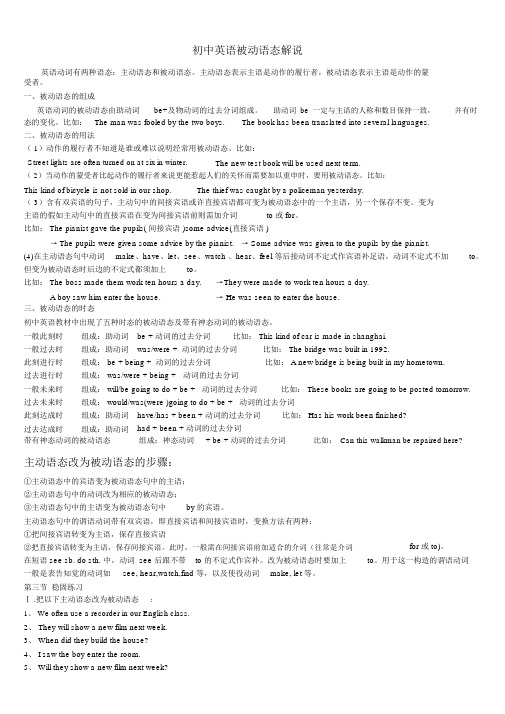
初中英语被动语态解说英语动词有两种语态:主动语态和被动语态。
主动语态表示主语是动作的履行者,被动语态表示主语是动作的蒙受者。
一、被动语态的组成英语动词的被动语态由助动词be+及物动词的过去分词组成。
助动词be一定与主语的人称和数目保持一致,态的变化。
比如:The man was fooled by the two boys.The book has been translated into several languages.二、被动语态的用法( 1)动作的履行者不知道是谁或难以说明经常用被动语态。
比如:并有时Street lights are often turned on at six in winter.The new test book will be used next term.( 2)当动作的蒙受者比起动作的履行者来说更能惹起人们的关怀而需要加以重申时,要用被动语态。
比如:This kind of bicycle is not sold in our shop.The thief was caught by a policeman yesterday.( 3)含有双宾语的句子,主动句中的间接宾语或许直接宾语都可变为被动语态中的一个主语,另一个保存不变。
变为主语的假如主动句中的直接宾语在变为间接宾语前则需加介词to 或 for。
比如: The pianist gave the pupils( 间接宾语 )some advice(直接宾语 )→The pupils were given some advice by the pianist. → Some advice was given to the pupils by the pianist.(4)在主动语态句中动词make、have、let、see、watch 、hear、feel 等后接动词不定式作宾语补足语,动词不定式不加to。
被动语态详解
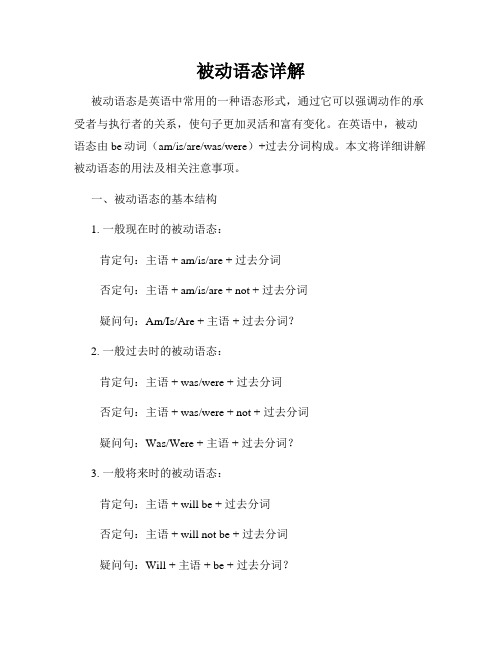
被动语态详解被动语态是英语中常用的一种语态形式,通过它可以强调动作的承受者与执行者的关系,使句子更加灵活和富有变化。
在英语中,被动语态由be动词(am/is/are/was/were)+过去分词构成。
本文将详细讲解被动语态的用法及相关注意事项。
一、被动语态的基本结构1. 一般现在时的被动语态:肯定句:主语 + am/is/are + 过去分词否定句:主语 + am/is/are + not + 过去分词疑问句:Am/Is/Are + 主语 + 过去分词?2. 一般过去时的被动语态:肯定句:主语 + was/were + 过去分词否定句:主语 + was/were + not + 过去分词疑问句:Was/Were + 主语 + 过去分词?3. 一般将来时的被动语态:肯定句:主语 + will be + 过去分词否定句:主语 + will not be + 过去分词疑问句:Will + 主语 + be + 过去分词?二、被动语态的用法1. 强调动作的承受者:主动语态:Tom wrote a letter.(汤姆写了一封信。
)被动语态:A letter was written by Tom.(一封信被汤姆写了。
)2. 当不知道或不关心动作的执行者时:主动语态:Someone broke the window.(有人打破了窗户。
)被动语态:The window was broken.(窗户被打破了。
)3. 当动作的执行者为明显的、普遍的或不需要具体指出时:主动语态:People speak English all over the world.(世界各地的人都说英语。
)被动语态:English is spoken all over the world.(英语在世界各地都被说着。
)4. 相应的介词有些动词后面需要与特定的介词连用,在被动语态中需要保留这些介词。
主动语态:They laughed at the man.(他们嘲笑那个人。
(完整)被动语态讲解
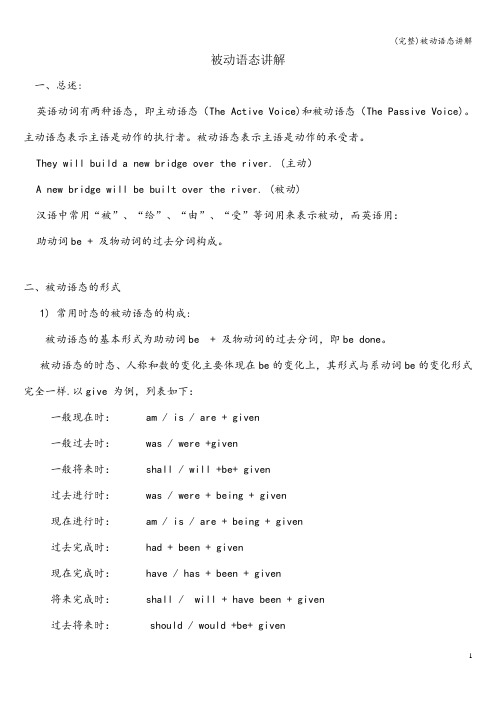
被动语态讲解一、总述:英语动词有两种语态,即主动语态(The Active Voice)和被动语态(The Passive Voice)。
主动语态表示主语是动作的执行者。
被动语态表示主语是动作的承受者。
They will build a new bridge over the river. (主动)A new bridge will be built over the river. (被动)汉语中常用“被”、“给”、“由”、“受”等词用来表示被动,而英语用:助动词be + 及物动词的过去分词构成。
二、被动语态的形式1) 常用时态的被动语态的构成:被动语态的基本形式为助动词be + 及物动词的过去分词,即be done。
被动语态的时态、人称和数的变化主要体现在be的变化上,其形式与系动词be的变化形式完全一样.以give 为例,列表如下:一般现在时:am / is / are + given一般过去时:was / were +given一般将来时:shall / will +be+ given过去进行时:was / were + being + given现在进行时:am / is / are + being + given过去完成时:had + been + given现在完成时:have / has + been + given将来完成时:shall / will + have been + given过去将来时: should / would +be+ given现在完成进行时:have/has been being done含情态动词的被动语态:情态动词+be done[注]被动语态没有将来进行时和过去将来进行时.2)被动语态的否定式:在第一个助动词后加not构成.Russian is not taught in our school. 我们学校不教俄语。
3)被动语态的疑问式:把第一个助动词提到主语之前,句尾加问号构成。
英语中的被动语态

英语中的被动语态被动语态是英语语法中常用的一种语态形式。
它可以用来表达替换主语的被动语气,使得被动语态句子更加突出动作的接受者或者状态的承受者。
在英语中,被动语态是一种重要的语法结构,对于学习英语的人来说,掌握被动语态的用法非常重要。
一、被动语态的定义及构成方式被动语态是通过在动词前加上助动词“be”的过去分词形式来构成的。
这里的助动词的种类包括“am, are, is, was, were, have(或has), had, will”,并且根据时态的不同将其进行了变化。
例如:一般现在时: am/are/is + 过去分词过去时: was/were + 过去分词现在完成时: have/has + 过去分词将来时: will + be + 过去分词构成被动语态的方式可以用一个简单的公式来表示,即:主语+ 助动词 + 过去分词。
例如:主动: The boy hit the ball.(男孩打了球。
)被动: The ball was hit by the boy.(球被男孩打了。
)二、被动语态的用途1、突出动作的承受者或者状态的承受者被动语态的最主要的用途就是通过替换主语来打出动作的承受者或状态的承受者的差异。
例如:主动: My father bought a new car yesterday.(我爸爸昨天买了一辆新车。
)被动: A new car was bought by my father yesterday.(昨天一辆新车被我爸爸买了。
)2、避免使用主语如果某些情况下,使用主语会使得句子过于重复或者语法不对,那就可以使用被动语态来代替主语。
例如:主动: People say that he is the best student in our school.(人们说他是我们学校最好的学生。
)被动: It is said that he is the best student in our school.(据说他是我们学校最好的学生。
被动语态的用法
被动语态的用法1.一般现在时的被动语态构成为:is / am / are + 及物动词的过去分词。
例如:我们的教室每天都被打扫。
我被要求努力研究。
刀子用于切割物品。
2.一般过去时的被动语态构成为:was / were + 及物动词的过去分词。
例如:去年建了一家新商店。
恐龙蛋很久以前就被放置了。
3.现在完成时的被动语态构成为:has / have + been + 及物动词的过去分词。
例如:这本书已经被翻译成了很多种语言。
很多国家已经发射了许多人造卫星。
4.一般将来时的被动语态构成为:will + be + 及物动词的过去分词。
例如:我们城市将会建造一家新医院。
明年将会种更多的树。
5.含有情态动词的被动语态构成为:情态动词 + be + 及物动词的过去分词。
例如:年轻的树必须经常浇水。
你的错误应该立即纠正。
门可能被从里面锁上了。
你的作业可以明天交。
6.现在进行时的被动语态构成为:am / is / are + being + 及物动词的过去分词。
例如:___正在修理我的自行车。
现在我的自行车正在被___修理。
他们正在那里种树。
现在树正在被他们种植。
1.不及物动词没有被动语态。
What will happen in 100 years。
Dinosaurs disappeared about 65 n years ago.2.有些动词用主动形式表示被动意义。
___.3.感官动词或使役动词使用省略to的动词不定式。
在主动语态中不带to,但变为被动语态时,须加上to。
例如:make somebody do something → somebody + be + made to do something。
see somebody do somethi ng → somebody + be + seen to do something。
A girl saw my wallet drop when she passed by。
动词被动语态讲解
模块八动词的被动语态(1)被动语态定义:被动语态是动词的一种特殊形式,用来说明主语与谓语动词之间的关系。
如果主语是动作的执行者(即某人做某事),便叫主动语态;如果主语是动作的承受者(即某事被做),便叫被动语态。
主动与被动的区别不是词序的区别,而是主语与谓语意义上的区别。
在英语中只有及物动词和一些相当于及物动词的词组才有被动语态的形式。
(2)英语中被动语态由“助动词be +动词的过去分词”构成。
助动词be有时态、人称和数的变化。
被动语态后的by短语有时可(1) 被动语态的用法:①不知道谁是动作的执行者(即不知道谁做)时用被动语态,省略by短语。
如:A man was killed in the accident.(一个人死于事故) This window was broken yesterday.(这扇窗子是昨天被打破的)②不说或者众所周知是谁做时,用被动语态,省略by短语。
如:Rice is also grown in this place.(这个地方也种水稻)A railroad will be built here in three years.(三年之后这里将要修建一条铁路)③强调动作的承受者,句尾加by短语。
如:It was written by Lu Xun.(它(书)是鲁迅写的)A pet dog is never killed by its owner.(宠物狗是不会被主人宰杀的)(2) 主动语态如何改写为被动语态:+受者)+(动作的承受者) (be +过去分词) (动作的执行者)(3) 注意点:①“动词+间接宾语+直接宾语”改为被动时,可以用间接宾语做被动句的主语。
如:His teacher gave him a dictionary.→He was given a dictionary by his teacher.(老师给他一本字典→他得到老师一本字典)也可以用直接宾语做被动句的主语,但是需用to或者for引出原句的间接宾语。
动词被动语态的讲解
• ⑤过去进行时 was/were+ being + 过去分词 • 如:The new house was being painted when I got home. • ⑥过去完成时 had +been+ 过去分词 • 如 He told me that the work had been finished.
动词过去分词变化 规则
• 1.动词变过去式 • (1)一般情况在动词尾加— ed.例如: work— worked, want—wanted • (2)以不发音的e结尾的动词,直接加—d.例如: live—lived, hope—hoped • (3)以“辅音字母+y“结尾的动词,变y为i再加ed.例如: study—studied, cry—cried • (4) 以重读闭音节一个辅音字母结尾的动词,双写 词尾的辅音字母再加— ed. • 例如: stop—stopped, beg—begged. • (5)词尾听加的— ed的发音,有以下几种情况: a. 以元音或浊辅音结尾的动词.加— ed后,— ed发音 浊辅音[d]. b. 以清辅音结尾的动词,加— ed后,— ed发清辅音[t]. c. 以[t] [d]结尾的动词,加— ed 后,— ed发[id],与结尾的[t]、[d]相拼,读作[tid]或 [did].
• ③ 现在完成时 have/has + been +过去分词 • 如:The work has been finished.
• ④ 一般过去时 was/were + 过去分词
• 如:The story was told by him. • Many birds were killed last year.
被动语态语法讲解
被动语态语法讲解(一)语态分类英语动词有两种语态.,主动语态和被动语态。
主动语态表示主语是动作的执行者,被动语态表示主语是动作的承受者。
如: They will build a new bridge over the river. (主动)A new bridge will be built over the river. (被动) 汉语中常用“被”、“给”、“由”、“受”等词用来表示被动,而英语用:助动词be + 及物动词的过去分词构成。
(二)被动语态的时态、人称和数的变化主要体现在be的变化上,其形式与系动词be的变化形式完全一样。
以give 为例,列表如下:一般现在时:am / is / are + done 一般过去时:was / were + done一般将来时:shall / will + be done 一般过去将来时:should / would + be done现在进行时:am / is / are + being + done 过去进行时:was / were + being + done现在完成时:have / has + been + done 过去完成时:had + been + done将来完成时:shall / will + have been + done 过去将来完成时:should / would + have been + done [注]被动语态没有将来进行时和过去将来进行时。
(三)常见的八种时态中的被动语态1. 一般现在时:(1)People grow rice in the south of the country. Rice is grown in the south of the country.(2)The school doesn't allow us to enter lab without a teacher. We are not allowed to enter lab without a teacher. 2. 一般过去时:(1)They agreed on building a new car factory last month. a new car building factory was agreed on last month.(2)The students didn't forget his lessons easily. His lessons were not easily forgotten3. 一般将来时:(1)They will send cars abroad by sea. Cars will be sent abroad by sea.(2)They will give plenty of jobs to school-leavers. Plenty of jobs will be given to school-leavers.5. 现在进行时:(1)The radio is broadcasting English lessons. English lessons are being broadcasted on the radio.(2) We are painting the rooms. The rooms are being painted.6. 过去进行时:(1)The workers were mending the road. The road was being mended.(2)This time last year we were planting trees here. Trees were being planted here this time last year.7. 现在完成时:(1)Someone has told me the meeting might be put off.I have been told the meeting might be put off.(2)He has brought his book here. His book has been brought here.(四)含有情态动词的被动语态:含有情态动词的被动语态是由“情态动词+ be+及物动词的过去分词”构成。
- 1、下载文档前请自行甄别文档内容的完整性,平台不提供额外的编辑、内容补充、找答案等附加服务。
- 2、"仅部分预览"的文档,不可在线预览部分如存在完整性等问题,可反馈申请退款(可完整预览的文档不适用该条件!)。
- 3、如文档侵犯您的权益,请联系客服反馈,我们会尽快为您处理(人工客服工作时间:9:00-18:30)。
模块八动词的被动语态
(1)被动语态定义:被动语态是动词的一种特殊形式,用来说明主语与谓语动词之间的关系。
如果主语是动作的执行者(即某人做某事),便叫主动语态;
如果主语是动作的承受者(即某事被做),便叫被动语态。
主动与被动的区别不是词序的区别,而是主语与谓语意义上的区别。
在英语中只有及物动词和一些相当于及物动词的词组才有被动语态的形式。
(2)英语中被动语态由“助动词be +动词的过去分词”构成。
助动
词be有时态、人称和数的变化。
被动语态后的by短语有时可
(1) 被动语态的用法:
①不知道谁是动作的执行者(即不知道谁做)时用被动语态,省
略by短语。
如:A man was killed in the accident.(一个人死于事故) This window was broken yesterday.(这扇窗子是昨天被打破的)
②不说或者众所周知是谁做时,用被动语态,省略by短语。
如:Rice is also grown in this place.(这个地方也种水稻)
A railroad will be built here in three years.(三年之后这里
将要修建一条铁路)
③强调动作的承受者,句尾加by短语。
如:It was written by Lu Xun.(它(书)是鲁迅写的)
A pet dog is never killed by its owner.(宠物狗是不会被主
人宰杀的)
(2) 主动语态如何改写为被动语态:
+
受者)
+
(动作的承受者) (be +过去分词) (动作的执行者)
(3) 注意点:
①“动词+间接宾语+直接宾语”改为被动时,可以用间接宾语做被动句的主语。
如:
His teacher gave him a dictionary.
→He was given a dictionary by his teacher.(老师给他一本字典
→他得到老师一本字典)
也可以用直接宾语做被动句的主语,但是需用to或者for引出
原句的间接宾语。
如:His teacher gave him a dictionary.
→A dictionary was given to.. him by his teacher.(老师给他一本
字典→一本字典由老师送给了他)
/His father made him a kite.
→A kite was made for
...him by his father.(他的父亲给他做了一个风筝→一个风筝由他的父亲做给了他)
②“动词+宾语+动词原形”改为被动时,动词原形前要加to.
如:The boss made the poor man work 12 hours a day.
→The poor man was made to.. work 12 hours a day.(老板让这个可怜的人一天工作12小时→这个可怜人被迫一天工作12小时)
③“动词+…+介词”改为被动时,介词一般在原位不动。
如:The girl takes good care of.. her little brother.
→The girl’s little brother is taken good care of.. by her.(女孩照
顾小弟弟→女孩的小弟弟由她照顾着)
④“be+过去分词”未必表示被动语态,而可能是系表结构。
如:He is pleased / worried / tired /…….(系表)(他高兴/焦虑/疲劳……)
He was hit / knocked down / told / shot / …….(被动)(他被击中/撞倒/关照/射中……)
1、含双宾语的主动语态的转换:可用其中任何一个宾语作主语,但用直接宾语作主语时,被动语态句子中的原间接宾语前要加必要的介词(多数加to, 个别加for)。
如:(1)My grandpa gave me a ball as the birthday present.
→I was given a ball as the birthday present (by my grandpa).
或→A ball was given to me as the birthday present.
(2)His aunt bought him a dictionary.
→He was bought a dictionary by his aunt.
或→A dictionary was bought for him by his aunt.
2、含复合宾语的主动语态的转换:变为被动语态时,宾补要保留,但当宾补是不带to的不定式时,必须加上to.
如:(1) They call him Lao Zhang.
→He is called Lao Zhang.
(2)I often hear her sing English songs.
→She is often heard to sing English songs.
注:被动语态的记忆口诀
被动语态强调“宾”,用be加上“过去分”。
“be”要随着主语变,人称时态要弄准。
“行为对象”作主语,逻辑主语“by”来引。
原句若是双宾语,一变“主”来一保“宾”。
“间宾”要把主语变,原来“直宾”还是“宾”。
直宾”要把主语变,“间宾”前加“to”最称心。
唯有原“宾”是“复合”,只有变宾要当心。
原句“宾补”变“主补”,位置不必挪寸分。
情态动词变“被动”,情态加be加过分。
如若“情态”后带to,变后有to才弄准。
“短语动词”变“被动”,相当“及物”莫疑心。
不过其后“介”或“副”,变后还得要承认。
